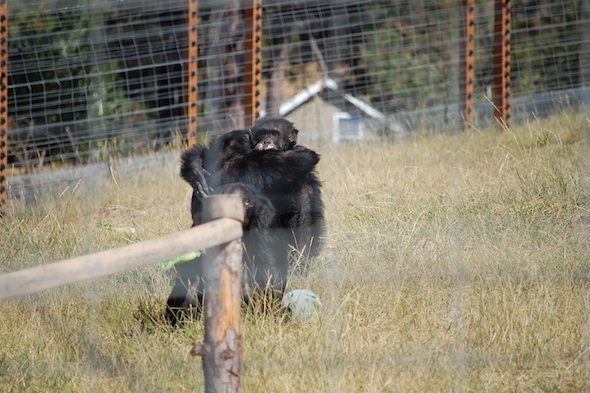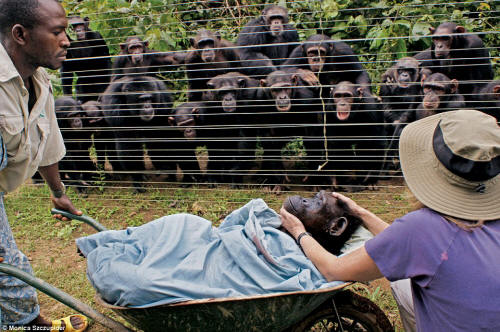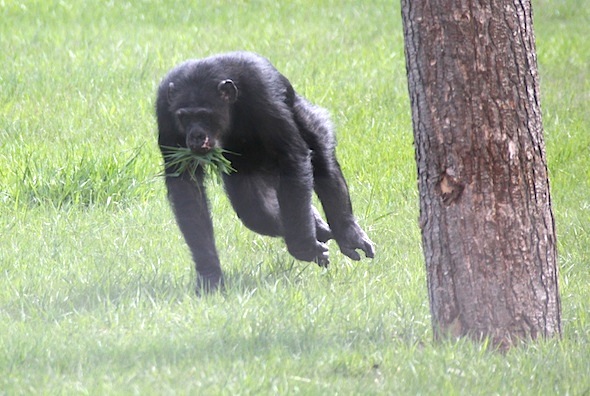The evidence in favor of protecting chimpanzees is overwhelming. We share over 98% of our DNA with them. Studies have shown that they have the capacity to create and use tools, to learn human languages, and to memorize and recall certain kinds of information faster and more accurately than college students. Field research has demonstrated that different communities have different cultures, that individuals form complex social alliances, and that they have the ability to hunt cooperatively.
But when I recite these facts, I feel like I am only telling part of the story. Taken individually, these abilities are fascinating, but to me they aren’t morally persuasive. Do chimpanzees really have to learn our language for them to deserve freedom from suffering? Do I really think that their ability to use tools is the reason why we shouldn’t lock them up and perform tests on them?
When you add them up, however, you start to understand that chimpanzees possess a remarkable richness and depth of experience. Yes, they are intelligent. Yes, they experience emotions. But the whole is even greater than the sum of its parts.
Over the years, I’ve thought about the moments that affected me most, the ones that deepened my understanding of chimpanzees and strengthened my resolve to help them, and they revolve around the two most fundamental experiences that we share with chimpanzees: life and death.
The first time I witnessed the death of a chimpanzee, Diana and I were working at the Fauna Foundation in Quebec, Canada. A chimpanzee named Pablo became suddenly ill, and before anything could be done to help him, he was gone. The story was detailed in a fantastic article by Joe D’Agnese in Discover Magazine. After Richard, the co-founder and veterinarian at Fauna, declared him dead, his body was laid on a blanket in one of the smaller rooms so that the other chimpanzees could come in and see him. I was not prepared for what came next. Over the next hour or so, we witnessed what I can only describe as a wake. Pablo’s family, the chimps that he had known through the hell of the lab and their eventual release to a wonderful and loving sanctuary, proceeded to come into his room, one or two at a time, and pay their respects. The older chimps seemed to accept his death and gently groomed his body for a while before moving on. The younger chimps, less experienced with death’s finality, tried to revive him, and when that didn’t work, they lashed out in anger.
Pablo’s death affected everyone at Fauna, and we all struggled to maintain our composure. As I headed down the hall, with tears running down my cheeks, I looked up to see someone waiting for me. Annie, the matriarch of the chimpanzees at Fauna, held her fingers out through the caging and offered a breathy pant of reassurance. After a lifetime of being told that humans were superior in all ways, I was being consoled by a loving, maternal chimpanzee, one who was much older and far wiser than me.
A few years ago, Monica Szczupider captured one of the most haunting photos that I have ever seen, one that speaks volumes about how chimpanzees deal with death. Following the death of Dorothy, a chimpanzee with strong ties to her family group at the Sanaga-Yong sanctuary in Cameroon, the staff wheeled her body to the fencing so that the other chimps could see her.
All cultures have their own way of dealing with death, but beneath the layers of ritual, our reactions are remarkably similar – the desire to spend one last moment with someone you love, and the need to hold those who are still with you even closer. In chimpanzees, we can see the root of this experience.
Many of the chimpanzees that we care for in sanctuaries lived for decades in laboratory cages. But they were alive only in the biological sense that their bodies continued to function. If your only knowledge of chimpanzees was of them living alone in small cages, you could be forgiven for thinking that there wasn’t much to their existence beyond eating, sleeping, and lashing out. What else could they do?
But at sanctuaries, we get to witness chimpanzees living for the first time. Not just being alive, but experiencing life, with all its ups and downs. I don’t think I will ever forgot the moment that we released the Cle Elum Seven onto Young’s Hill. They had been watching us build the enclosure for months, and by the end of the summer they were ready to walk out under the open sky for the first time. As soon as the door was opened, they rushed outside without hesitation. But before they ran off into the great outdoors, they stopped and hugged. They hugged out of fear. They hugged for joy. They hugged because they, like us, experience the world not just as individuals but as friends and as family members. Whatever it was that they were feeling, it was something that needed to be shared.

When we first met the chimps in the lab, we actually commented to each other that they didn’t seem as traumatized as we had expected, given their circumstances. But in hindsight, it was only because we didn’t know them yet. And maybe because they hadn’t had a chance to know themselves yet. The Missy that we met in that basement cell may have never had the opportunity to run before. But now, Missy is a running machine. She runs for no reason, in all directions, just to experience running. She lives to run.
I can’t say for sure that I know what it’s like to be a chimpanzee. In fact, I’m sure we can never really know. But just as we humans are more than what can be measured on IQ tests and SATs, there is far more to being a chimpanzee than we once thought.






